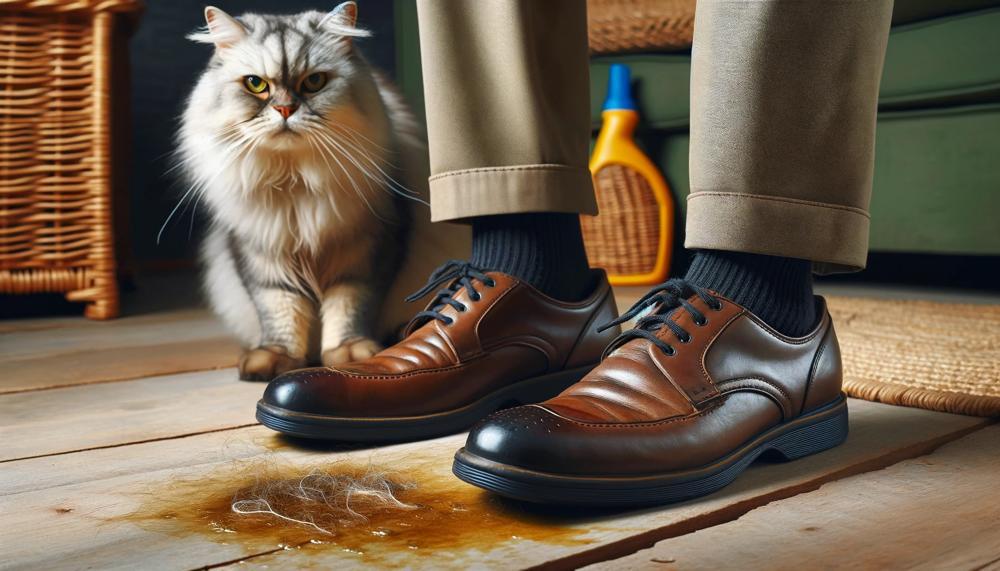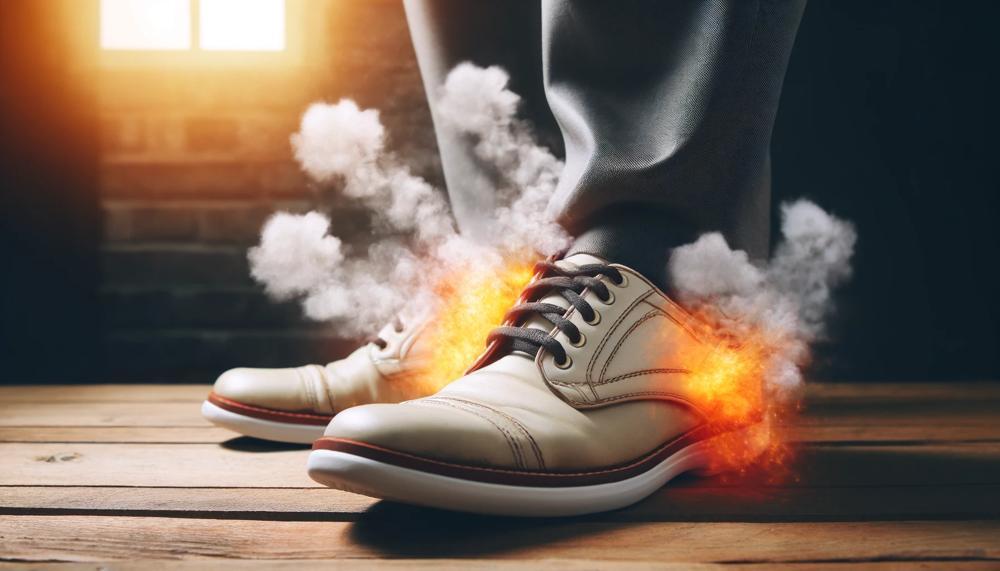Have you ever been hit with a wave of disgust when you take off your shoes and are met with the pungent smell of cat urine? It’s enough to make anyone want to throw their shoes out the window. So, why do my shoes smell like cat pee?
Your shoes may smell like cat urine if they’ve come into contact with cat urine, which has a strong, distinctive odor. Other reasons your shoes may smell like cat urine include:
- Porous padding: If you don’t have a cat, the padding around the outside of the sole of your shoes may be porous and hold water, which can provide a place for bacteria to grow.
- Polyurethane component: A polyurethane component in the sole may break down and/or rot due to exposure to water, releasing ammonia and causing a cat urine smell.
- Inner layer of the soles: The inner layer of the soles may contain something that breaks down to release amines, which cause the fishy catty smell.
- Synthetic materials: Certain synthetic materials used in shoes, when mixed with bacteria, fungi, and sweat, can produce smelly feet.
So, let’s get started.
Why do my shoes smell like cat pee?
Contents
- 1 Why do my shoes smell like cat pee?
- 2 Why do your shoes smell like cat urine?
- 3 The shoe can smell like cat urine
- 4 Why does your body release too much ammonia while sweating?
- 5 How to get rid of odor from shoes
- 6 How to get cat urine smell out of shoes
- 7 How to prevent your shoes from smelling
- 8 Conclusion
There are multiple potential reasons why your shoes may reek of cat urine, including the growth of bacteria and fungus, subpar materials, and external elements such as pet pee.
However, you can tackle this issue by maintaining proper hygiene, rotating your shoes, investing in quality materials, and addressing any underlying medical conditions.
Below is a table summarizing the possible causes and solutions for shoes that smell like cat pee.
| Possible Causes | Solutions |
|---|---|
| Bacteria and fungus growth | – Wash your feet every day with soap and water – Make sure your feet are completely dry before putting on shoes – Give your shoes a break and let them air out – Invest in high-quality, breathable materials |
| Inferior materials | – Opt for better-quality, breathable materials – Take breaks from wearing the same pair of shoes |
| Medical conditions (e.g., hyperhidrosis) | – Consult a doctor for treatment options |
Why do your shoes smell like cat urine?
Nobody likes having their shoes smell like cat urine. It’s embarrassing and can make others around you uncomfortable. That’s why it’s important to understand the causes of this issue and take necessary steps to prevent it.
By keeping your shoes clean and dry, you can eliminate the moist environment that bacteria and fungus thrive in. Additionally, rotating between different pairs of shoes allows them to air out and prevents any one pair from getting too worn out or smelly. Using deodorizing products or antifungal treatments can also help combat any odors that may arise.
And of course, keeping pets away from your shoes is essential as their urine can also contribute to the smell.
Lastly, if you have any medical conditions that may be causing foot odor, addressing those issues can also help alleviate the problem.
The shoe can smell like cat urine
It’s not a pleasant experience and can be embarrassing in public. There are many possible culprits for this unpleasant odor, such as bacteria and fungi build-up, lack of ventilation, wearing the same shoes daily, pet urine, cleaning products with ammonia, and even certain medical conditions.
It’s important to address this issue as soon as possible, not only for your own comfort but also to avoid potential embarrassment.
One possible cause of this smell is the accumulation of bacteria and fungi in your shoes. This can happen if you wear the same shoes every day without proper ventilation. Bacteria and fungi thrive in warm and damp environments, making your shoes a perfect breeding ground for them. To combat this, try to alternate between different pairs of shoes and make sure to let them air out after each wear.
Another possible cause is pet urine. If you have pets at home, it’s possible that they have accidentally urinated on your shoes. Even if you clean it up, the smell can linger and become more prominent over time. In this case, using cleaning products with ammonia may exacerbate the issue. Instead, try using natural remedies like vinegar or baking soda to eliminate the smell.
Certain medical conditions can also contribute to this unpleasant odor. For example, patients with diabetes may experience a sweet or fruity smell in their shoes due to high sugar levels in their sweat. If you suspect that a medical condition may be causing the smell, it’s important to consult with a healthcare professional for proper treatment.
Why does your body release too much ammonia while sweating?

There are numerous factors that can lead to an excess production of ammonia in our bodies, including diet choices and hydration levels. For example, consuming foods high in protein or low in carbohydrates can increase the amount of ammonia in our bodies.
In addition, dehydration can also cause our bodies to produce more ammonia, as a lack of fluids makes it harder for our bodies to convert ammonia into urea. Furthermore, certain medical conditions, such as kidney or liver disease, can also contribute to the release of ammonia through sweat.
Not only does excessive ammonia release through sweat cause an unpleasant odor, but it can also be harmful to our overall health. Ammonia is a toxic substance that can irritate our skin and respiratory system. It can also cause damage to our internal organs if not properly eliminated from our bodies. This is why it is important to understand and take steps to prevent excessive ammonia release through sweat.
To prevent this issue, it is crucial to maintain a balanced diet and stay hydrated. By eating a well-rounded diet and drinking plenty of water, we can help our bodies properly convert ammonia into urea.
Additionally, practicing good hygiene habits, such as regularly washing our feet and changing our socks and shoes, can also help reduce the risk of excessive ammonia release through sweat.
How to get rid of odor from shoes
We have some simple yet effective methods to get rid of that unpleasant odor once and for all.
These methods may not be as complicated as rocket science, but they are highly effective in eliminating the ammonia smell of cat urine from your beloved footwear.
| Method | Description | Effectiveness |
| Blotting | Dab the affected area with a paper towel to remove excess urine. | Effective in removing excess urine, but may not completely eliminate the odor. |
| Vinegar Soak | Soak your shoes in a mixture of water and vinegar, or use a commercial pet odor remover. | Highly effective in neutralizing the ammonia smell of cat urine. |
| Washing with Mild Detergent | Wash your shoes with a mild detergent either in the machine or by hand if they are leather. Sprinkle Borax inside the shoes and let them sit overnight before washing. | Effective in removing bacteria and sweat buildup that cause the odor. |
| Vinegar Spray | Spray white or apple cider vinegar onto the affected areas of your shoes and let it sit for up to 2 hours before wiping clean. | A quick and easy solution that effectively neutralizes the odor. |
| Baking Soda Absorption | Sprinkle baking soda on your shoes and let them sit for at least overnight to absorb the odors. | An effective method for absorbing odors, but may not completely eliminate them. |
In addition to these methods, here are some tips for preventing the cat pee smell from returning to your shoes:
- Ensure your shoes are completely dry after wearing them in wet conditions.
- Use shoe deodorizers or inserts to absorb moisture and prevent bacteria growth.
- Rotate your shoes and avoid wearing the same pair for multiple days in a row.
- Consider using odor-resistant socks or foot powder to reduce sweat and bacteria buildup.
- Keep your shoe storage area clean and free of any potential sources of cat urine odor.
How to get cat urine smell out of shoes
Removing the smell of cat urine from shoes can be a tricky task, but there are various methods that can effectively eliminate the odor. These include using household items like vinegar, hydrogen peroxide, and baking soda, as well as commercial pet odor removers.
However, it’s important to note that simply covering up the smell with these solutions will not fully eradicate it. Thoroughly washing and drying your shoes after treatment is crucial to fully remove any residual smell or product residue.
Here is a table summarizing these methods and how to use them:
| Method | Instructions |
| Vinegar | Mix equal parts white vinegar and water. Soak a cloth in the solution and rub it onto the affected areas of the shoes. Rinse with water and dry upside down. |
| Hydrogen Peroxide | Mix 1 part hydrogen peroxide with 1 part dish soap. Rub the solution onto the shoes with a cloth or old toothbrush. Rinse with water and dry upside down. |
| Baking Soda | Make a paste using equal parts baking soda and water. Apply the paste to the affected areas of the shoes and let it sit for a few hours before brushing it off. Alternatively, you can sprinkle baking soda inside the shoes and leave it overnight before shaking it out. |
| Borax | Sprinkle borax inside the shoes and leave it overnight before shaking it out. |
| Pet Odor Remover | Follow the instructions on the product label for best results. |
In addition to these methods, it’s crucial to thoroughly wash your shoes with water and mild soap after using any of these solutions. This will help to remove any residual smell or product residue.
Prevention is key in avoiding the smell of cat urine on your shoes. Here are some tips to keep your shoes smelling fresh:
- Allow your shoes to air out and dry completely after each use.
- Wear socks made of breathable materials to absorb sweat.
- Alternate between wearing different pairs of shoes to allow them to fully dry out.
- Use foot powder or antiperspirant on your feet to reduce sweating.
- Consider using odor-absorbing insoles in your shoes.
- Avoid wearing the same pair of shoes for extended periods without washing or airing them out.
How to prevent your shoes from smelling
To avoid your shoes from reeking of feline urine, here are some steps you can take:
- Keep your feet spick and span: The initial step in warding off shoe stench is to maintain impeccable foot hygiene. Make sure to wash your feet every day and dry them thoroughly, especially in between the toes.
- Wear moisture-wicking socks: Opt for socks made of breathable materials that will help absorb sweat and keep your feet dry. Avoid donning socks made of synthetic fabrics as they can trap moisture and contribute to the unpleasant odor.
- Rotate your shoes: Refrain from wearing the same pair of shoes every single day. Allow them to breathe by rotating between different pairs. This will also give your shoes a chance to dry out and prevent the growth of bacteria.
- Utilize shoe deodorizers: There are various products available in the market specifically designed to eradicate shoe stench. You can use shoe deodorizing sprays, powders, or balls to absorb any foul smells.
- Clean your shoes regularly: Consistently cleaning your shoes can help prevent the growth of bacteria, mold, and mildew that can cause the pungent feline urine smell. You can use a damp cloth or a mixture of water and vinegar to wipe down the inside of your shoes.
- Store your shoes properly: Be sure to store your shoes in a well-ventilated area away from direct sunlight and moisture. You can also place cedar shoe trees inside your shoes to absorb any excess moisture and odors.
- Use baking soda: Baking soda is known for its absorbing properties and can effectively eliminate odors from shoes. Sprinkle some baking soda inside your shoes and let it sit overnight before shaking it out the next day.
Conclusion
In summary, the pungent odor of cat urine in your shoes can be attributed to a combination of bacteria, sweat, and external sources like pet accidents.
To combat this issue, it is crucial to maintain proper hygiene practices, rotate between different pairs of shoes, and allow them to thoroughly dry out. Utilizing deodorizing products and addressing any underlying medical conditions can also aid in eliminating the unpleasant smell.
Remember to wash your feet daily, wear moisture-wicking socks, and regularly clean and store your shoes appropriately.






